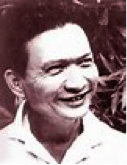 Che Lan Vien, born Phan Ngoc Hoan, was a Vietnamese poet and writer who, early in his life would take an active part in the August Revolution of 1945. This mass uprising was in protest against French colonial rule. In just two weeks the Vietnamese revolutionaries had gained control in most parts of the country including the city of Hanoi which is where the Provisional Democratic Republic was formed by President Ho Chi Minh.
Che Lan Vien, born Phan Ngoc Hoan, was a Vietnamese poet and writer who, early in his life would take an active part in the August Revolution of 1945. This mass uprising was in protest against French colonial rule. In just two weeks the Vietnamese revolutionaries had gained control in most parts of the country including the city of Hanoi which is where the Provisional Democratic Republic was formed by President Ho Chi Minh.
Che Lan Vien was born January 14th 1920 in Dong Ha, central Vietnam. When he was a young boy his family moved south and he started writing poetry at the age of around 12 or 13. He went to school in Quy Nhon City and after leaving school he tried his hand at teaching for a while. At the age of 17 he published his first volume of poetry entitled Poetry School Rebellion.
His poetry went through several different phases and styles. One of his initial collections, entitled Dieu Tan, is said to contain quite demonic and astrological imagery and subject matter. He was quite philosophical in his thinking and writing. Dieu Tan refers to the ruins of the extinct Cham Kingdom – Che Lan Vien was ethnic Cham by birth – and the poems within this volume tell of death, catastrophe and a lost heritage. His writings during wartime were heavily political and nationalistic and afterwards, as he went through his life, his poems spoke of more normal life and past life events. His poems varied from short four line pieces to long, rambling essays. His shortest was entitled The Duck Porridge and referred to the hunger of the people. One of his more famous poems was called School of my Heart, Tomorrow I Will Be Separated From You! Here is a short translated extract from it:

The 1954 Geneva Accords marked the end of the August Revolution which saw the French agree to a ceasefire, withdrawal of troops from the Indochina region and the formation of three separate countries – Vietnam, Cambodia and Laos. Che Van Lien returned to Hanoi and became a leading member of the Writers Association of Vietnam and wrote for several journals in support of the ongoing political protests. He also edited several newspapers.
Che Van Lien remained a prolific writer and commentator within literary and political circles and became a member of the National Assembly of Vietnam. After the fall of South Vietnam in 1975 he went to live in Ho Chi Minh City with his wife, novelist Vu Thi Thuong. Their daughter Phang Thi Vang also became a writer.
He died in Thong Nhat Hospital, Ho Chi Minh City at the age of 69 on June 24th 1989. He was posthumously awarded the State of Vietnam Ho Chi Minh Prize for literature and art in 1996 and has a street named after him in the city.

